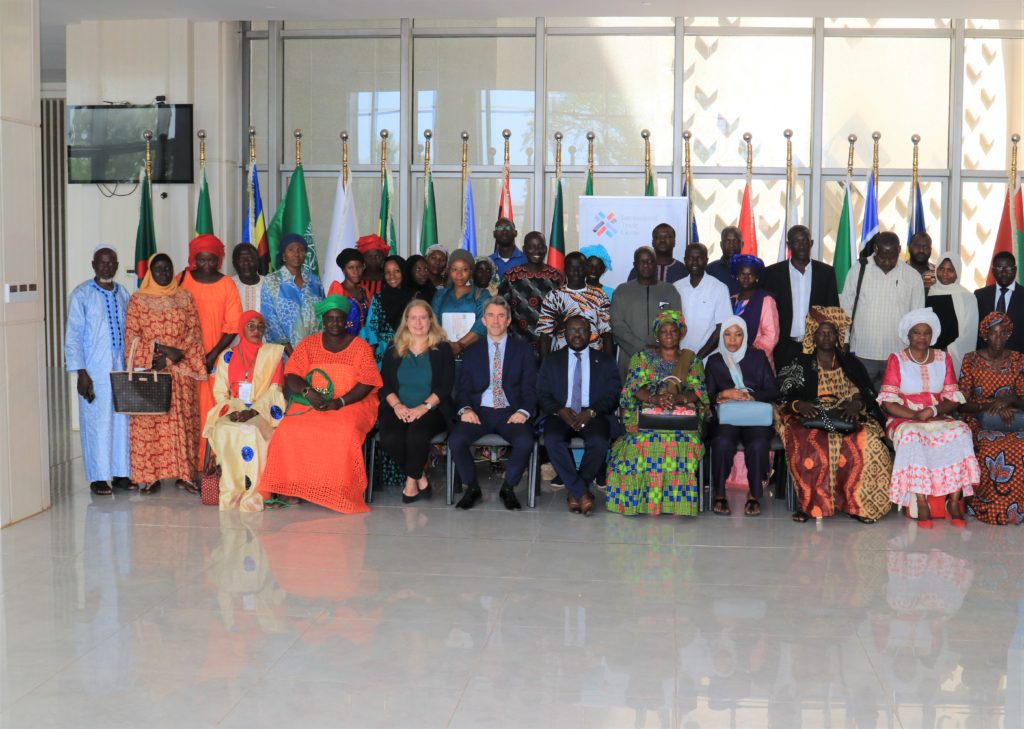ITC In Partnership With Ministry Of Trade Launched Jokkalante Market Platform

By Landing Ceesay
The International Trade Centre (ITC) and the Ministry of Trade, Industry, Regional Integration and Employment (MOTIE) launched the Jokkalante Market Platform on Tuesday, with funding from the Enhanced Integration Framework (EIF).
Jokkalante Market Platform is a free digital platform that connects farmers, buyers, and transporters. It aims to promote local horticultural products and increase the income of women vegetable gardeners.
At the ceremony, Mr. Lamin Dampha, Permanent Secretary of the Ministry of Trade, said that the Jokkanlante Market project is very close to his heart. He explained that it came at a time when trade in the Gambia was in a very difficult period. Mr. Dampha said that the project’s target beneficiaries are mainly women horticultural producers who were severely impacted by a lack of market access during the COVID-19 pandemic. He further stated that the COVID-19 pandemic has changed the way business is conducted around the world.
“The world is fast moving towards digitalization and even LDCs such as The Gambia needs to acclimatize with this new dimension to better integrate into the multilateral trading system and to boost domestic trade performance. Pandemics will come and go, and The Gambia needs to position herself to be a resilient and flexible country that can adapt to unforeseen external shocks and ensure that economic operators can trade under the most difficult conditions.
“E-commerce is an increasingly important aspect of today’s economy. It offers opportunities to overcome some of the traditional obstacles to trade, including the costs associated with physical distance. This opens up unprecedented opportunities for businesses to engage in cross-border trade. This platform has been designed within the realities of the Gambian context,” he said.
Mr. Modou Touray, Technical Advisor and Monitoring & Evaluation Specialist, International Trade Center(ITC) said the COVID-19 Recovery through Digitalisation and Market Access for Women Horticulture Producers Project aims to sustainably increase the income of women horticulture producers and processors in The Gambia, who were disproportionately affected by the socio-economic crisis triggered by COVID-19.
Mr. Touray said among other challenges of the horticultural sector that the project helps to address are limited market access – disorganised marketing arrangements and the unavailability of appropriate storage and transport facilities.
Mr. Touray said the project would also address high post-harvest losses and inadequate storage, processing, and value-addition facilities; as well as limited information on horticultural data for effective planning.
“But even in the context of these constraints, horticulture benefits from good growing conditions and has high economic value in The Gambia. The Gambia has a favourable climate for growing fruits and vegetables. The horticulture sector accounts for just 2% of the cultivated land and 8% of the agriculture production by volume, yet it represents 16% of the agriculture production in value, proof that horticulture offers higher economic prospects relative to other agricultural products.
“Despite these, the commercial potential of horticulture remains untapped in The Gambia. It is estimated that over 90% of Gambian horticulture production is not commercialized. Local production is dominated by small-scale subsistence farming of less than two hectares and also within 454 gardens spread around the country,” Mr. Touray said.
Mr. Touray said that even though the Gambia has a thriving horticulture industry, the country’s fruit and vegetable consumption is still low compared to the World Health Organization’s (WHO) recommended standard.
He said that Gambians consume an estimated 30 kilograms of vegetables per year, which is far below the WHO’s recommendation of 146 kilograms.
“Our first intervention in linking women’s horticulture gardens was in 2020 during COVID but was only able to facilitate the buying of 903 bags of onion and over 41 tons of various food crops, benefitting 215 farmers (197 women). In 2021, we were able to link 9643 bags of onions benefitting 1242 farmers (1200 women). In 2022 the quantity was 6041 bags benefiting 615 farmers (567 women),” he said.
Mr. Balla Kuyateh, Senior Trade Economist, at the Ministry of Trade, said the project is geared towards creating market linkages in the horticultural value chains to mitigate the impact of the Covid-19 crisis on women’s businesses as a result of Government restrictions in the economy.
Mr. Kuyateh said the overall objective of the project is to sustainably increase the income of women horticulture producers and processors in The Gambia, who were affected by the socio-economic crisis triggered by COVID-19 as well as to ensure economic and social recovery from the COVID-19 crisis through increased participation of women farmers in the economy.
“Since the inception of this project in March 2021, the Ministry in collaboration with ITC has been working closely with relevant stakeholders to establish a digital marketing platform to enhance market access for women producers. During this collaboration, a series of activities were implemented which led to the development of the digital platform we are at the stage of launching lunch today.
“We orient women farmers and entrepreneurs about the project with the objective of enhancing their understanding and awareness of digital value chain initiatives for effective utilization of digital platforms in the horticultural value chains for increased income. We collaborated with partners of the project such as Planning Service Unit of (MOA), FAO, ROOTS Project, United Purpose, and other ITC projects in the country in order to create synergies between existing digital marketing platforms in the country,” he said.
The beneficiaries of the project praised the platform as a “life-changing” initiative that makes selling their products easier. They said the project helps to prevent their products from rotting in their stores and fields.

